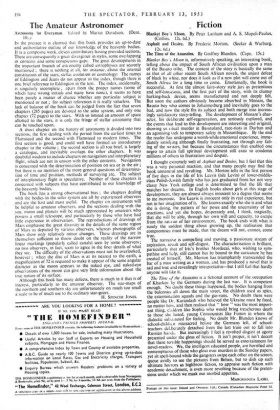Fiction
The Time of the Assassins. By Godfrey Blunden. (Cape. 15s.) Blanket Boy'a Moon is, informatively speaking, an interesting book, telling about the impact of South African civilisation upon a man of the Basuto tribe. The content of the story is basically the same as that of all other recent South African novels, the unjust defeat of black by white, nor does it look as if a new plot will come out of South Africa for a long time to come. Emotionally, the book is successful. At first the almost fairy-story style jars as pretentious and self-bonscious, and the first part of the story, with its clumsy harking-back device, seems manufactured and not deeply felt. But soon the authors obviously become absorbed in Monare, the Basuto boy who comes to Johannesburg and inevitably goes to the bad, and now the style fits its subject and both merge into increas- ingly satisfactory stoty-telling. The development of Monare's char- acter, his deliberate self-regeneration, are seriously explored, and the events that lead to this development are interesting and original, showing us ritual murder in Basutoland, race-riots in Durban and an agonising trek to temporary safety in Mozambique. By the end the reader has undergone a worth-while emotional experience, imme- diately satisfying although finally frustrating, not through any fail- ing of the writers, but because the circumstances that enabled one negro to attain full spiritual development still exist to condemn millions of others to frustration and despair.
I thought extremely well of Asphalt and Desire, but I feel that this was a very personal reaction, and that many people may find the book unnatural and revolting. Mr. Morton tells in the first person of five days in the life of Iris Leavis (née Levin) of lower-middle- class Polish-Jewish family who has just graduated from her not very classy New York college and is determined to find the life that matches her dreams. In English books about girls at this stage of development, they are almost always innocent to a degree that seems to me moronic. Iris Leavis is innocent only in real experience, but not in her imagination of it. She knows exactly who she is and what she is doing, the pattern of her poses and the uncertainty of her reactions, and yet she hopes, desperately and, I think, tragically, that she will be able, through her own will and capacity, to escape from the rat-run of her environment. The book ends with what is surely the saddest thing about growing up, the realisation that compromises must be made, that the dream will not, cannot, come true.
The narrative is compelling and moving, a passionate stream of aspiration, revolt and self-disgust. The characterisation is brilliant, particularly that of Iris's brother Mordecai, who, wishing to sym- pathise and Harp, still cannot but be bound to the caricature he has created of himself. Mr. Morton has triumphantly transcended the bar of a man writing as a woman, and has produced a novel that is sad and true and revealingly interpretative—but 1 still feel that hardly anyone will like it.
The Time of the Assassins is a fictional account of the occupation of Kharkov by the Germans during the last war. It is competent enough. No doubt these things happened, the bodies hanging from the balconies all down the main street, the children used as spies, the extermination squads and the gas-vans. No doubt there were people like Dr. Karandash who believed the Ukraine must be freed, no matter how, and then realised that " how " was the most import- ant thing, ei.ldren like Sophia who would bring treacherous death to those she hated, young Communists like Fomin in whom the dialectic sub,,tituted for feeling. No doubt Mr. Blunden knows of school-childn..n massacred before the Germans left, of school- teachers del.berately detached from the last train out to fall 'into Russian hands. But increasingly 1 feel a revolted disgust at agony presented under the gloss of fiction. It ,isn't proper, it isn't decent that these terrible happenings should be served as entertainment for novel-readers. We, the intelligent educated people, are horrified and contemptuous of those who gloat over murders in the Sunday papers, yet sit spell-bound while the gangsters swipe each other on the screen, queue avidly to see the pictures from Belsen, but to dish up such ultimate horrors as highbrow fiction, to Appraise such fiction :with academic detachment, is even more revolting because of the preten- sions under which we mask our morbid appetites.
MAROHANITA LASKI.


































 Previous page
Previous page